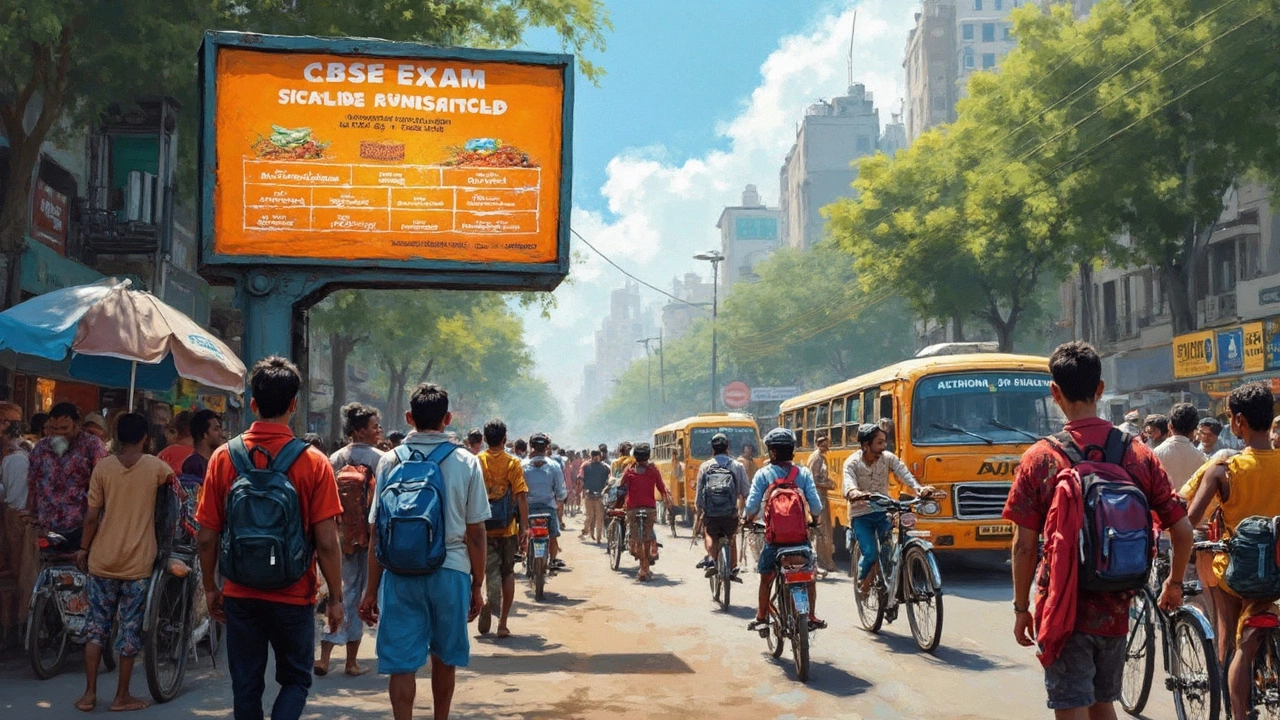The CBSE board, short for the Central Board of Secondary Education, is one of the most prominent educational boards in India. But one question keeps popping up—are CBSE exam papers the same across all states? The short answer: Yes, mostly. CBSE's central administration ensures a standard level of education, meaning the question papers are set uniformly for the majority of subjects.
However, there's more to the story. CBSE designs these papers in a way to ensure fairness and equal standards for students from all regions. But does that mean every paper is a carbon copy in each state? Not entirely. Some open-ended elements allow slight variations, mainly due to practical considerations like language options and region-specific subjects.
Now, before you start imagining drastically different questions, know this: the core content remains consistent. But yes, instructions or reference sections might be adjusted to make life a bit easier for students in different linguistic areas. This regional tweaking doesn’t affect the academic rigor but aims to accommodate practical needs.
- Understanding CBSE Examination System
- How CBSE Maintains Uniformity
- Regional Variations: Myth or Reality?
- Tips for Students Preparing for CBSE Exams
- Insights for Educators and Parents
Understanding CBSE Examination System
The CBSE examination system is designed to provide a standardized educational experience to students all across India. What does this mean? Simply put, every student registered under the CBSE board sits for exams that are meticulously planned and executed at the national level.
Exam Structure and Design
Yes, the structure of these exams is meant to evaluate the students' understanding of the core subjects, but it's not just about rote learning. CBSE exams often include application-based questions to test real understanding and practical knowledge of the topic. This makes it crucial to grasp concepts rather than just memorize them.
The question papers are set by a panel of experts who ensure that they are robust and fair. These papers aim to cover the syllabus comprehensively without particular regional biases.
Academic Calendar and Exam Timing
The CBSE follows an academic calendar where exams are typically held annually in March, with results announced by May. This schedule is fixed to avoid disparities, ensuring that students across the nation, whether in bustling Mumbai or remote Sikkim, complete their academic year uniformly.
Evaluation and Result Publication
Evaluation is another key step. After exams, answer sheets are evaluated in a very systematic manner. Multiple evaluators might assess a single paper to minimize errors, enhancing fairness and accuracy.
Exam Languages and Optional Subjects
One interesting aspect of the CBSE examination is that students can choose to write their exams in either English or Hindi, and in some cases region-specific languages, thereby accommodating linguistic diversity.
Additionally, beyond compulsory subjects like math and science, CBSE offers a range of optional subjects that cater to varied interests—from IT applications to fine arts. This flexibility helps students tailor their learning according to their future aspirations.
Here's a brief overview of the core subject emphasis across grades:
| Grade | Core Focus |
|---|---|
| 9th-10th | Maths, Science, Social Studies, Language |
| 11th-12th | Stream wise: Science, Commerce, Humanities |
How CBSE Maintains Uniformity
The CBSE board has built a robust system to keep its question papers standardized across the entire country. It's no small feat managing such a massive educational network, but they've got it pretty streamlined.
Centralized Paper Setting
First off, the question papers are created at a centralized location by a panel of experienced educators. This group comprises subject experts and teachers with knowledge of the CBSE syllabus. They ensure that the paper covers all the essential aspects of the curriculum, maintaining a uniform difficulty level.
Moderation Process
Before the papers hit the printers, they go through a thorough moderation process. This involves checking questions for clarity, difficulty, and even average completion time. If a question seems off, it gets reworded or replaced. This entire process ensures that students in Chennai aren't scratching their heads over puzzling questions while their peers in Delhi have it easy.
Identical Paper for Mainstream Subjects
For core subjects like Mathematics, Science, and English, the CBSE board maintains identical question papers across regions. This consistency means that if you've prepped for these subjects in any city under the CBSE umbrella, you're on the same playing field as everyone else.
Question Bank System
CBSE also uses a comprehensive question bank system. Schools and teachers can access this database to help students practice. Most of the papers are based on this question bank, ensuring that practice aligns well with exam content.
Secure Exam Protocols
Last but definitely not least, CBSE implements tight security and distribution protocols. Confidentiality is critical, and strict measures prevent any leaks or biases that could skew uniformity.
Overall, the CBSE board's structured approach ensures that exam papers are consistent and fair, giving every student across India an equal shot at success, no matter where they live.

Regional Variations: Myth or Reality?
When it comes to the CBSE paper, the notion that there might be regional variations often stirs curiosity and concerns among students and parents alike. Let's set the record straight: the core content of CBSE exams remains uniform across India. This consistency ensures that all students, no matter where they are, are evaluated on the same academic standards.
However, some myths about differences arise from misunderstanding how these exams are tailored. It's true that there are minor adjustments in question papers, especially when it's about the language medium offered. Say you're taking an exam in a Hindi-speaking region, the paper might be available in Hindi or English, which caters to the linguistic preference of students without altering the questions themselves.
Medium and Linguistic Adjustments
CBSE reflects India's linguistic diversity in its approach. While the questions in the CBSE exams are designed to be the same, translations are provided for regional languages. Based on data, approximately 20% of students choose a regional language option, highlighting how crucial these options are for comprehension.
Ensuring Fairness and Accessibility
To keep the playing field equal, CBSE uses a thorough translation and auditing process ensuring no discrepancies creep in due to language. A rigorous standardization process checks that translations remain faithful to their English counterparts, ensuring fairness for all examinees.
Exceptions to the Rule
A few subjects unique to particular regions might have different question papers. For instance, subjects that are region-specific, like certain localized history or environmental studies courses, understandably have content reflecting local implications. Still, even these are designed to match the difficulty level of papers available nationwide.
Tips for Students Preparing for CBSE Exams
Getting ready for CBSE exams can be a bit overwhelming, especially with the vast syllabus. But don't worry; there are ways to prepare effectively and ace those exams!
Understand the Exam Pattern
First and foremost, understand the paper pattern. CBSE often sticks to a certain format, so get familiar with the type of questions that appear. This will help you manage your time during the actual exam.
Keep Up with the Syllabus
Make sure you know the CBSE syllabus inside out. Check the official CBSE website or consult your teacher to know any updates or changes in the syllabus. Cover all subjects and don't skip topics you find tough.
Set a Study Schedule
Have a clear and realistic study timetable. Allocate more hours to difficult subjects but don't ignore the ones you're comfortable with. Break your schedule into blocks with time for breaks to avoid burnout.
Practice with Previous Papers
One of the best tips is to practice past papers. They give you a feel for the exam and help you identify important topics. Also, they train you to tackle time constraints and exam pressure. Practice makes perfect, right?
Revise Regularly
Revision is key. Late night cramming isn’t as effective as steady revision. Go over your notes regularly, and try summarizing chapters in bullet points for quick referencing.
Healthy Habits
Your brain needs fuel to function well. Maintain a balanced diet and get a good night's sleep before exam days. Regular exercise can also relieve stress and keep you sharp.
Stay Positive
Last but not least, stay positive and confident. Don't let the pressure get to you. Remember that you've prepared well and trust your instincts during the exam.
For those worried about stats, check out this little reminder:
| Year | Passing Percentage |
|---|---|
| 2021 | 99.04% |
| 2022 | 94.40% |
As you can see, a high percentage of students clear the exams. Keep your spirits up, and you're sure to join their ranks!

Insights for Educators and Parents
CBSE exams can be a challenging experience for students, and your support can make a world of difference. Whether you're a teacher guiding students or a parent looking to help your child excel, understanding the CBSE paper framework is key.
Creating a Supportive Environment
For parents, the home environment plays a crucial role in a child's studies. Make sure they have a quiet, distraction-free space for studying. Encourage regular breaks to boost focus and prevent burnout. As for the educators, fostering a positive classroom atmosphere where students feel comfortable asking questions can greatly enhance their learning process.
Building Exam Strategies
Discuss exam strategies with students. This includes time management during exams, understanding the question patterns, and effective revision methods. Encourage students to practice with past exam papers which are usually accessible for free on the CBSE website.
Focusing on Strengths and Weaknesses
Help your child or students identify their strong and weak subjects. Spend more time reinforcing areas they're struggling with, and offer praise to build their confidence in subjects they already excel in.
Staying Updated with Syllabus Changes
CBSE frequently updates its syllabus and exam patterns. Ensure you're aware of these changes by regularly checking the official CBSE website or following reliable educational news sources. Knowledge of these updates helps in aligning teaching methods with current requirements.
Encouraging a Balanced Approach
While studies are important, equally crucial are extracurricular activities. Encourage participation in sports, art, or other hobbies. These activities play a significant role in stress management and overall development.
By staying informed and proactive, educators and parents can significantly shape the educational journey, making the CBSE syllabus more approachable and less daunting!

